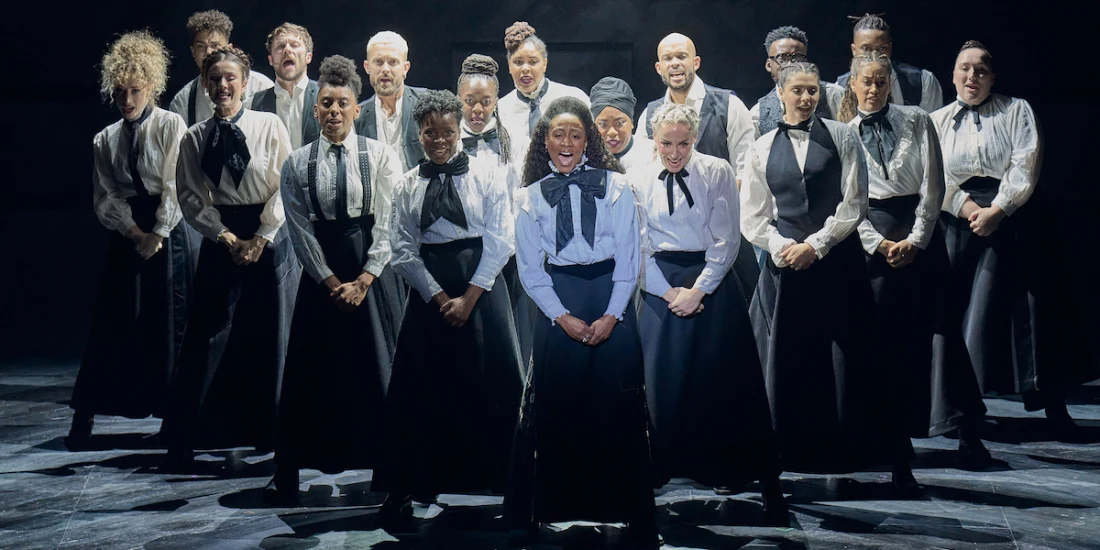'Sylvia' review – Beverley Knight leads an inspiring but overstuffed hip-hop Suffragette musical
Read our review of Beverley Knight in the hip-hop musical Sylvia, now playing at the Old Vic through 1 April. Get Sylvia tickets on London Theatre.
Kate Prince’s hip-hop take on the Suffragettes has the cheer-worthy aim of ensuring we all understand how long and how hard these incredible women fought to secure our rights. In fact, it’s also been something of a battle to get this new work to the stage: originally a dance show, Sylvia was meant to premiere in 2018 as a musical, wound up semi-opening as a work-in-progress, and is now finally ready to bring us those “first steps of a revolution”.
As per the title, the focus is mainly on Sylvia, daughter of the almighty Emmeline Pankhurst. Unlike her more biddable older sister Christabel, Sylvia diverged from her mother’s approach: while Emmeline focussed on securing votes for women, an increasingly socialist Sylvia wanted to expand to the working-class. Emmeline grew militant when diplomacy failed; Sylvia grew more enamoured of pacifism.
It’s a fascinating dynamic, placing conflict over how to achieve change (so debating the merits of direct action, message discipline and intersectional solidarity – although, oddly, race is never mentioned) at the heart of a family. You could parallel that with any number of current issues, whether it’s environmental protest or Brexit dividing families.
Prince’s use of contemporary dialogue, music (Josh Cohen and DJ Walde's enjoyable mix of hip-hop, funk, soul and R&B) and infectiously fun, propulsive movement also helps bridge that gap. However, there’s a large elephant in the room, and its name is Hamilton, to which this inevitably invites comparisons.
But, while Lin-Manuel Miranda made very deliberate and thoughtful choices about paralleling his Founding Fathers with modern rappers, and where to deploy diverse casting (crucially, George III is played by a white actors), Sylvia feels conceptually muddled.
Prince (who co-wrote the book with Priya Parmar, and also directs and choreographs) has spoken about hip-hop culture being rooted in oppression. Yet all of its characters sound and move in the same way, whether the Suffragettes or their male opponents. In fact, the most dynamic performance comes from a “Braap!”-roaring, show-stealing Jade Hackett – as Winston Churchill’s fiercely anti-suffrage mother. So what are we meant to take from that?
Churchill is also played by a black actor, but is a foppish, hen-pecked cartoon villain. The tone generally skews light-hearted, which makes the material engaging, but it’s challenging to switch tack for horrifying moments like the hunger-striking Suffragettes being force-fed in prison, or a vicious beating by the police (although Prince does find an expressive movement language for both). If we can’t take the opposition seriously, we’re in danger of underestimating our heroines.
Sylvia also zips through the years, giving us little time to really dig into the lead characters’ lives and motivations. I wished we could have seen the Pankhursts interacting as a family, rather than just spouting slogans at one another, so we could feel the weight of what is sacrificed here – or that Christabel’s queerness could be characterised as more than just a potential PR problem.
Charming though Alex Gaumond makes him, there’s too much time devoted to Sylvia’s romance with Labour Party founder Keir Hardie instead. It’s also a shame to see the argument weighted so heavily in Sylvia’s favour in the latter stages: she’s painted as a peace-loving, saintly martyr, adored by the working class (who we only actually meet briefly), while Emmeline becomes an elitist monster.
And yet: one phenomenal number, in which Sylvia and Emmeline finally spill their fear, anger, resentment, desires and shared trauma, demonstrates what this show could be. With roof-raising vocals and diva riffs, Beverley Knight shows how Emmeline’s courage, passion and determination is calcifying into dictatorial intransigence, while Sharon Rose’s Sylvia finally breaks free with a rush of innovative rapping. It’s emotionally revealing as well as a fraught political fight, and it’s given space to fully land.
That’s not the case elsewhere in a show that is often highly entertaining and inspiring, thanks to a committed company and creative elements like Andrzej Goulding’s lively video projections. Yet ultimately it feels overstuffed – too much telling, not enough dramatising. Prince might take a cue from the Suffragettes: “deeds, not words.”
Sylvia is at the Old Vic through 1 April. Book Sylvia tickets on London Theatre.
Photo credit: The cast of Sylvia at the Old Vic (Photo by Manuel Harlan)
Originally published on

